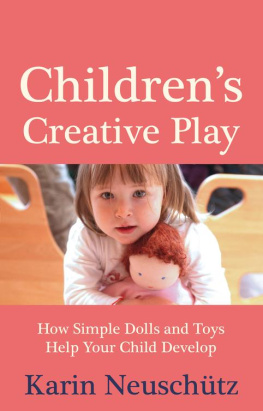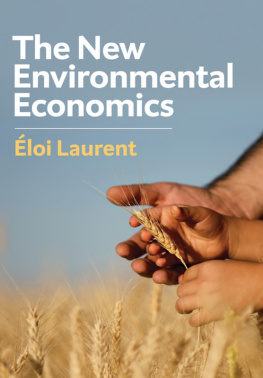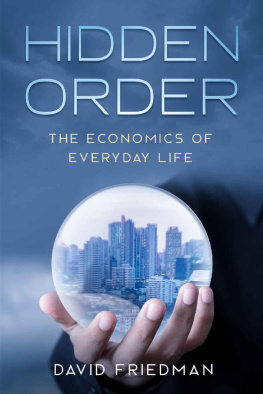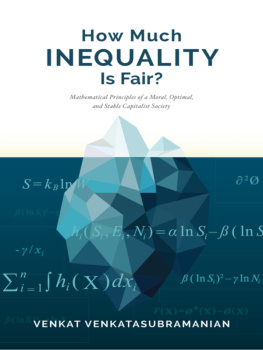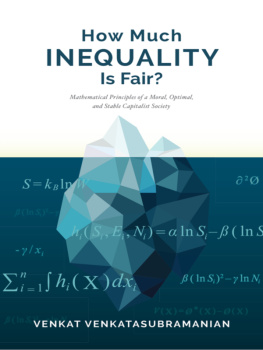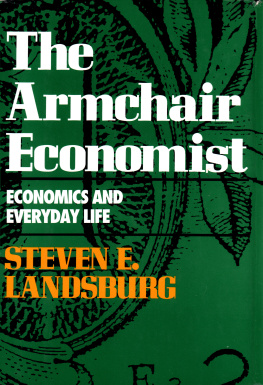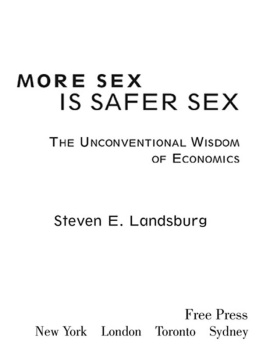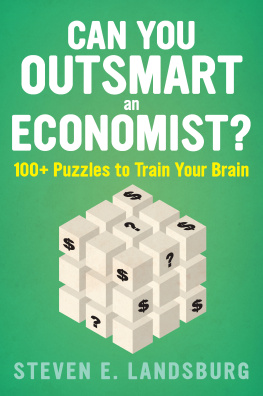


THE FREE PRESS
A Division of Simon & Schuster Inc.
1230 Avenue of the Americas
New York, NY 10020
www.SimonandSchuster.com
Copyright 1997 by Steven Landsburg
All rights reserved,
including the right of reproduction
in whole or in part in any form.
THE FREE PRESS and colophon are trademarks of Simon & Schuster Inc.
Designed by Carla Bolte
Manufactured in the United States of America
10 9 8 7 6 5 4 3 2 1
Library of Congress Cataloging-in-Publication Data
Landsburg, Steven E.
Fair play: what your child can teach you about economics, values, and the meaning of life/by Steven E. Landsburg.
p. cm.
Includes bibliographical references.
1. EconomicsMoral and ethical aspects. 2. EconomicsStudy and teaching (Elementary)Case studies. 3. Concepts in childrenCase studies. 4. United StatesEconomic conditions1993I. Title. HB72.L36 1997 330dc21
97-35813
CIP
ISBN 0-684-82755-7
ISBN-13: 978-1-4516-1239-4
eISBN-13: 978-1-4516-1240-0
includes several lines from In Country Sleep by Dylan Thomas, from The Poems of Dylan Thomas. Copyright 1967 by The Trustees for the Copyrights of Dylan Thomas. Reprinted by permission of New Directions Publishing Corp.
CONTENTS
Acknowledgments
The ideas in this book were forged, refined, and polished by fire. The fire was ignited by my colleagues in the Lunch Group, who strive daily, over sandwiches and coffee, to illuminate every aspect of the human condition. Almost always there are sparks. Often there is a flash of insight. Occasionally there is a conflagration.
Our ambition is to understand the world, both as it is and as it ought to be. Each day, one or more of us offers an idea for the groups consideration. Each offering is subjected to criticism so intense and so precisely focused that the idea must either be reduced to ashes or purified and hardened.
Every idea in this book has been tested in the crucible of the lunchtable, andin my possibly controversial opinionsurvived. A dozen times as many were consumed by the flames. Let me explain why that process matters.
Economists believe a lot of things that strike ordinary thoughtful people as self-evidently false. (More disturbingly, economists know to be false a lot of things that strike ordinary thoughtful people as self-evidently true.) It is therefore important to emphasize that we dont just make this stuff up as we go along. Economics is a serious discipline, with reasonably precise standards of logic and evidence. In much of my earlier writing, Ive tried to explain what those standards are, and to demonstrate how we apply them to reach conclusions that are sometimes startling.
In my earlier book, The Armchair Economist, and in my magazine columns, I have argued that increased promiscuity can retard the spread of AIDS, that charitable people would never give to more than one large charity, and that monopoly theatre owners would not charge high prices for popcorn except under rather special circumstances. Those conclusions might appear implausible, but they all meet the ultimate test of good economic reasoning: Every one of them can be translated into pure mathematics, whereupon it can be verified that the conclusions follow inevitably from the (clearly stated) assumptions. No discourse about economics should be taken seriously unless it meets that test.
This book contains a lot of discourse about economics, and by the standard Ive just established, all of it deserves to be taken seriously. I am sure of that because Ive performed the mathematical translations myself, as I do whenever I write about economic issues. I am therefore certain that those parts of the book which concern themselves with pure economics are correct, even when they are contrary to what I might have guessed before I calculated.
But this book also contains a lot of discourse about things that are not strictly economicsthings of more fundamental importance, like fairness, and justice, and tolerance, and responsibility. That discourse is not entirely susceptible to mathematical verification. Thus my faith in its correctnessand I have considerable faithmust be based on some other powerful discipline. Without that basis, my thoughts on fairness and justice would be no more appropriate for presentation to a general audience than a list of my favorite movies.
The discipline I have come to rely on is the discipline of the lunchtable, where successful ideas must be internally consistent, compatible (in logic and in spirit) with established principles, and applicable in a multitude of hypothetical scenariosand where every possible failure to meet those criteria is honestly acknowledged and explored. That discipline is less precise than pure mathematics, and I am accordingly less certain of my conclusions about fairness than of my conclusions about economics. But as far as I am aware, it is the best discipline available.
I did not invent all the ideas in this book. But even if I had, I wouldnt have written about them without first subjecting them to the level of scrutiny thatin my experienceonly the Lunch Group can provide. Among those who have been particularly helpful are John Boyd, James Kahn, and Alan Stockman, all of whom have provided me with extensive comments both during and after lunch. I am immensely grateful to them. I am grateful too for the helpful comments of Lauren Feinstone, who has stopped coming to lunch but is with us in spirit.
One of the many great things about the Lunch Group is that no dominant figure has ever emergedthe depth of thought and intellectual ardor are uniformly high, and few conclusions are reached without significant contributions from every member. But for the particular issues that are addressed in this book, I owe an exceptionally large debt to Mark Bils. Mark brings to the table an unshakable conviction that fairness is fundamentally important; an insistence that intellectual inquiry can reveal important truths about how we should behave; an eye for the surprising, apt and fruitful analogy that was invisible until Mark revealed it and impossible to ignore thereafter; and an instinct for the kind of irony that demands reconsideration of everything you thought you knew. Through his insistence that fairness could not mean one thing on the playground and another in the marketplace, Mark was the direct inspiration for this book.
Parts of this book have been expanded from my columns in Forbes and Slate. Those that appeared in Slate have benefited from intelligent and sensitive editing, for which I humbly thank Michael Kinsley and Jack Shafer. I am grateful also for the patience, encouragement, and good sense of Bruce Nichols, my editor at the Free Press.
My final acknowledgment is to the staff of Barnes and Noble in Pittsford, New York, where I spend several hours a day working on my laptop computer. Theyve made me feel warmly welcome, and I hope I can repay them by helping them sell a lot of books.
1
The Economist as Parent and the Parent as Economist

H UNGER AND FATIGUE MAKE ME CRANKY. Food and sleep cheer me up. Somehow I reached adulthood without fully recognizing these truths. I knew them in the way that I knew Aaron Burr was the third Vice President of the United States, but I didnt know them in the way that I know not to step in front of oncoming traffic. They werent built into my instincts.
Next page

